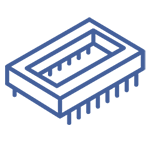Elon Musk: The Neuralink Brain Chip Developed By Its Company Could Help Treat Morbid Obesity

Neuralink: Elon Musk's entire brain chip presentation in 14 minutes (supercut)
Elon Musk has said that the Neuralink brain chip developed by his company could help treat morbid obesity. Experts say the billionaire's dream is not as far-fetched as it seems.
Professor Andrew Jackson, a neural interface expert at Newcastle University, told Insider, "I think it's more incredible than other claims about the potential of neurotechnology."
Musk made the suggestion in a TED interview on April 14, adding "morbid obesity" to the growing list of diseases he thinks Neuralink could help treat.
Experts interviewed by Insider said that a commercially available brain chip to eliminate obesity has a long way to go, but with the right scientific support, the concept has promise.

Brain Implants to Lose Weight?
Neuralink, founded by Musk in 2016, is developing a microchip to be implanted in the human skull. Tiny wires equipped with electrodes fan out from the device into the brain, allowing it to read and potentially stimulate brain activity.
Musk has previously named a variety of neurological disorders he believes Neuralink could treat, including Parkinson's disease and Alzheimer's disease. He has also made far-fetched claims about the chip's potential to "solve autism" and create a "symbiosis" between humans and artificial intelligence.
Other than Musk's comments in a recent TED interview, there is no more information on how Neuralink could help solve the obesity problem.
However, Sadaf Farooqi, a professor of metabolism and medicine at Cambridge University, said the concept is feasible in a broad sense.
"We and others have shown that in some people with severe obesity, it's a function of specific brain regions, namely the hypothalamus, which does often drive increased appetite," she says.
The hypothalamus is a gland located in the center of the brain that plays a critical role in controlling hormone production.
If you can find a way to target specific areas or even specific neurons that drive appetite, then theoretically, a drug or technique could improve the life of the patient," Faruqi said.
Brain implants are also arguably less invasive than other treatments for morbid obesity, said Jackson of Newcastle University. Some of these treatments involve changing the shape and function of a patient's digestive system.

Early Tests Yield Mixed Results
Some researchers are so confident in the brain implant technology that they have begun early proof-of-concept trials in humans - with mixed results.
One trial involving six morbidly obese patients - defined in the study as having a body mass index above 40 - involved a brain implant that transmits frequent electrical impulses to the hypothalamus. According to Elemental, one participant lost more than 100 pounds, three lost a little, but not a lot, and two others lost no weight at all.
In another similar trial, only one of the three participants lost weight, according to Elemental. Another small trial is underway.
"I would say these trials are very much on the leading edge," Faruqi said. "So they may not be providing as much information."
"But the fact that they've made progress and I think a little bit of benefit for some people is encouraging."

Treating Symptoms or Causes
Francesco Rubino, director of metabolic surgery at King's College London, said the brain implant technology is promising, but a chip that focuses solely on reducing appetite could "fail.
"So far, nothing we've tried based on this hypothesis has worked," he said.
The new study suggests that it's not just the way people eat that causes them to be overweight. It could also be that the body isn't properly regulating weight by burning available fat, Rubino said. "It's like a tank full of fuel, but there's some kind of dysfunction, so it's not using the fuel efficiently."
Rubino says if you can find the trigger for the disease and target it with an implant, you can get to the source of the problem.
A brain chip that can effectively combat obesity may still have a long way to go. For one thing, Neuralink has not yet been approved for human testing, and Musk said in his TED interview that once the company can start implanting chips in the brain, it will focus on brain and spinal cord injuries for "probably a decade.
Jackson of Newcastle said that, as with many of Neuralink's claims, "in addition to technical development, a lot of science is needed to make it work as a treatment.
Related News
1、Chip Packaging Lead Time Has Grown to 50 Weeks
2、Eight Internet of Things (IoT) Trends for 2022
3、Demand for Automotive Chips Will Surge 300%
4、Volkswagen CFO: Chip Supply Shortage Will Continue Until 2024
5、BMW CEO: The Car Chip Problem Will Not Be Solved Until 2023
6、Shenzhen: This Year Will Focus on Promoting SMIC and CR Micro 12-inch Project
 UTMEL 2024 Annual gala: Igniting Passion, Renewing BrillianceUTMEL18 January 20243088
UTMEL 2024 Annual gala: Igniting Passion, Renewing BrillianceUTMEL18 January 20243088As the year comes to an end and the warm sun rises, Utmel Electronics celebrates its 6th anniversary.
Read More Electronic Components Distributor Utmel to Showcase at 2024 IPC APEX EXPOUTMEL10 April 20243936
Electronic Components Distributor Utmel to Showcase at 2024 IPC APEX EXPOUTMEL10 April 20243936Utmel, a leading electronic components distributor, is set to make its appearance at the 2024 IPC APEX EXPO.
Read More Electronic components distributor UTMEL to Showcase at electronica ChinaUTMEL07 June 20242553
Electronic components distributor UTMEL to Showcase at electronica ChinaUTMEL07 June 20242553The three-day 2024 Electronica China will be held at the Shanghai New International Expo Center from July 8th to 10th, 2024.
Read More Electronic components distributor UTMEL Stands Out at electronica china 2024UTMEL09 July 20242789
Electronic components distributor UTMEL Stands Out at electronica china 2024UTMEL09 July 20242789From July 8th to 10th, the three-day electronica china 2024 kicked off grandly at the Shanghai New International Expo Center.
Read More A Combo for Innovation: Open Source and CrowdfundingUTMEL15 November 20193666
A Combo for Innovation: Open Source and CrowdfundingUTMEL15 November 20193666Open source is already known as a force multiplier, a factor that makes a company's staff, financing, and resources more effective. However, in the last few years, open source has started pairing with another force multiplier—crowdfunding. Now the results of this combination are starting to emerge: the creation of small, innovative companies run by design engineers turned entrepreneurs. Although the results are just starting to appear, they include a fresh burst of product innovation and further expansion of open source into business.
Read More
Subscribe to Utmel !
![AMEOF3-24SBJZ-324]() AMEOF3-24SBJZ-324
AMEOF3-24SBJZ-324aimtec
![PT15NV17-472A2020-I-PM-S]() PT15NV17-472A2020-I-PM-S
PT15NV17-472A2020-I-PM-SAmphenol Piher Sensing Systems
![PT10MV10-474A2020-I-PM-S]() PT10MV10-474A2020-I-PM-S
PT10MV10-474A2020-I-PM-SAmphenol Piher Sensing Systems
![PT15NV15-224A2020-I-PM-S]() PT15NV15-224A2020-I-PM-S
PT15NV15-224A2020-I-PM-SAmphenol Piher Sensing Systems
![PT10LV10-504A2020-PM-S]() PT10LV10-504A2020-PM-S
PT10LV10-504A2020-PM-SAmphenol Piher Sensing Systems
![PVG3K203C01R00]() PVG3K203C01R00
PVG3K203C01R00Bourns Inc.
![TPF45000-385]() TPF45000-385
TPF45000-385TDK-Lambda Americas Inc
![AME15-5SMAZ-T]() AME15-5SMAZ-T
AME15-5SMAZ-Taimtec
![AMFE305150-LN22]() AMFE305150-LN22
AMFE305150-LN22aimtec
![AME20-5SBJZ-ST]() AME20-5SBJZ-ST
AME20-5SBJZ-STaimtec





